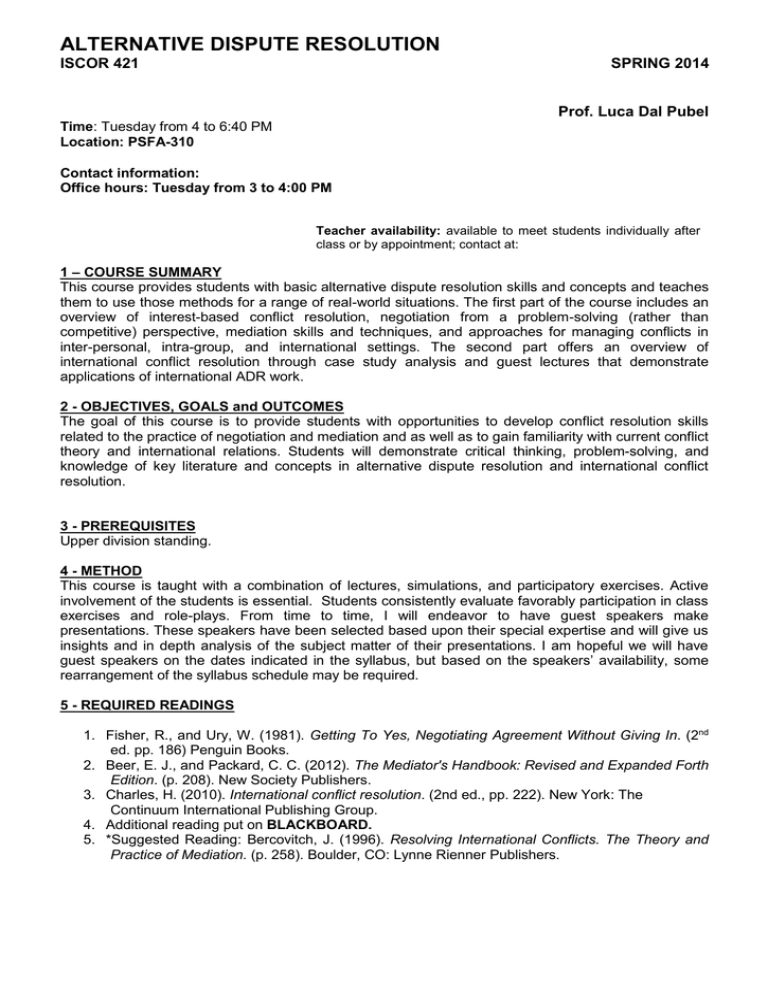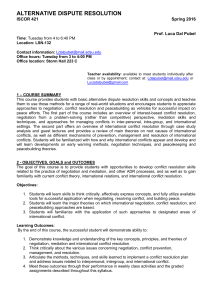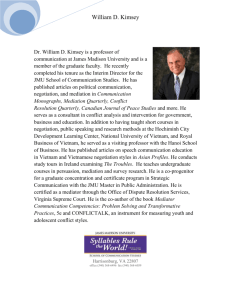ALTERNATIVE DISPUTE RESOLUTION ISCOR 421 SPRING 2014
advertisement

ALTERNATIVE DISPUTE RESOLUTION ISCOR 421 SPRING 2014 Prof. Luca Dal Pubel Time: Tuesday from 4 to 6:40 PM Location: PSFA-310 Contact information: Office hours: Tuesday from 3 to 4:00 PM Teacher availability: available to meet students individually after class or by appointment; contact at: 1 – COURSE SUMMARY This course provides students with basic alternative dispute resolution skills and concepts and teaches them to use those methods for a range of real-world situations. The first part of the course includes an overview of interest-based conflict resolution, negotiation from a problem-solving (rather than competitive) perspective, mediation skills and techniques, and approaches for managing conflicts in inter-personal, intra-group, and international settings. The second part offers an overview of international conflict resolution through case study analysis and guest lectures that demonstrate applications of international ADR work. 2 - OBJECTIVES, GOALS and OUTCOMES The goal of this course is to provide students with opportunities to develop conflict resolution skills related to the practice of negotiation and mediation and as well as to gain familiarity with current conflict theory and international relations. Students will demonstrate critical thinking, problem-solving, and knowledge of key literature and concepts in alternative dispute resolution and international conflict resolution. 3 - PREREQUISITES Upper division standing. 4 - METHOD This course is taught with a combination of lectures, simulations, and participatory exercises. Active involvement of the students is essential. Students consistently evaluate favorably participation in class exercises and role-plays. From time to time, I will endeavor to have guest speakers make presentations. These speakers have been selected based upon their special expertise and will give us insights and in depth analysis of the subject matter of their presentations. I am hopeful we will have guest speakers on the dates indicated in the syllabus, but based on the speakers’ availability, some rearrangement of the syllabus schedule may be required. 5 - REQUIRED READINGS 1. Fisher, R., and Ury, W. (1981). Getting To Yes, Negotiating Agreement Without Giving In. (2nd ed. pp. 186) Penguin Books. 2. Beer, E. J., and Packard, C. C. (2012). The Mediator's Handbook: Revised and Expanded Forth Edition. (p. 208). New Society Publishers. 3. Charles, H. (2010). International conflict resolution. (2nd ed., pp. 222). New York: The Continuum International Publishing Group. 4. Additional reading put on BLACKBOARD. 5. *Suggested Reading: Bercovitch, J. (1996). Resolving International Conflicts. The Theory and Practice of Mediation. (p. 258). Boulder, CO: Lynne Rienner Publishers. 5 - ASSESSMENT Students are expected to fulfill the following course assignments: 1. Participation Active participation is essential for this course. Active participation in the course includes the student’s full engagement in all activities, discussions, and exercises. The instructor will grade your performance by the frequency with which you engage in discussion, ask questions, and volunteer for activities during the course. 2. Conflict Analysis – Midterm Paper Students are to write a three- to five-page analysis (double spaced, 12 pt. font) of two real conflicts, one interpersonal (one - two pages) and one national or international conflict (two – three pages). The paper should provide a brief summary of the conflict, a conflict analysis mapping key parties and their underlying needs and interests, a description of the conflict dynamics to date, and a proposed conflict intervention strategy. In the paper students should reference (and interrogate) relevant concepts, theory and models from class and other outside sources. 3. Quizzes (2 given at random) on concepts and readings 4. Final Paper This will be a research assignment regarding the significance of international conflict resolution or application of a particular international peacebuilding issue of interest to you. The topic will be subject to my approval. The assignment shall require a minimum of three sources and include your personal vision and action plan for conducting, encouraging or promoting international peacebuilding. 6 – Extra Credit: Up to 1/3 of a letter grade (Ex: A- to A) for attendance and one page reflection paper of two personal events related to conflict or conflict resolution. 7 - EVALUATION and GRADING SYSTEM 1. Midterm 25% 2. Final 30% 3. Participation 30% 4. Quizzes 15% The following grading system will be observed: 0 - 59 = F, 60 - 69 = D, 70 - 72 = C-, 73 - 76 = C, 80 - 82 = B-, 83 - 86 = B, 87 - 89 = B+, 90 - 92 = A-, 77 - 79 = C+, 93 - 100 = A 8 - ATTENDANCE and BEHAVIOR This is an interactive class. Please note that: A. More than 3 absences will result in grade deduction except for extraordinary circumstances. B. Punctuality is appreciated. Students must arrive in class on time: any lateness, leaving class during the lesson without notice, not showing up on time after the break, or leaving earlier, will impact the participation grade and the Final Grade. Missing half a lesson or more will be considered as one full absence. C. It is the responsibility of the student to catch up on any missed work and to keep track of his or her absences and cases of tardiness. D. Computers may be used for taking notes during lectures. However, use of Gmail, Facebook, Twitter, or any other social networks is not permitted. Computers will not be permitted during class exercises. Texting and other use of phones during class time is not permitted. In case of emergency calls, students are required to leave class. E. Academic dishonesty: Academic dishonesty will not be tolerated. All written work must be your original work (i.e., not previously submitted for credit in any course, either at SDSU or at any other academic institution). Please familiarize yourself with the University Policy regarding cheating and plagiarism at: http://csrr.sdsu.edu/academics1.html And also be aware of the Student Grievance procedures, available on-line at: http://www.sa.sdsu.edu/ombuds/grievanceprocedures.html F. Dress: This class will simulate professional ADR work. While there is no dress code, please be conscious of how your clothing choices can influence your work. G: Disabilities: Students with disabilities who need special accommodations in class or on tests must take arrangements through Student Disability Services, located at Calpulli Center, Suite 3101, phone number 619-594-6473, webpage http://www.sa.sdsu.edu/sds/ . 9) CLASS SCHEDULE Please bear in mind that the contents of individual classes may be slightly changed throughout the course in accordance with the overall learning process and specific needs of the students. Class Date Class Topic Due at the Start of Class: readings and assignments Jan 28th Introduction to class Getting to Yes, Introduction Feb 4th Nature and Soucers of Conflict Mediator’s Handbook: pp. 11-15 Social Identity and Intergroup Conflict Additional reading provided by Instructor Conflict Resolution and ADR Methods Additional reading provided by Instructor Feb 18th Intro to Negotiation Getting to Yes: Ch. 1, 2, 3 Feb 25th Negotiation Theory and Practice Getting to Yes: Ch. 4, 5, 6 Mar 4th Intro to Mediation Mediator’s Handobook: pp. 3-10, 16-24, 76-86 Mar 11th The Mediation Process Video and Practicum Mediator’s Handbook: pp. 27-64, 89-130 Mar 18th Conflict Resolution and International Relations (Theory) International Conflict Resolution: pp. 11-19, pp. 28-49 International Mediation *Resolving International Conflicts: pp. 1-32 Feb 11 th Midterm Paper Due Mar 25 th The Yugoslavia Conflict and European *Resolving International Conflicts: pp. 171Mediation 188 Conflict Case Study: Kosovo Speaker: Prof. Richard Bainter Preparation materials (articles provided by Instructor) April 8th Conflict Case Study: Northen Ireland Speaker: Prof. Michael Fryer International Conflict Resolution: pp. 78103 April 15th Conflict Case Study: Israel – Palestine International Conflict Resolution: pp. 104133 What Went Worng? Class discussion nd April 22 Reconciliation and Nation-Building Case Study: South Africa Movie International Conflict Resolution: pp. 54-76 April 29th International Negotiation Practicum Case Scenarios (provided by Instructor) May 6th Debrief and Restorative Justice Speaker: Bridget Lambert (NCRC) Preparation materials (articles provided by Instructor) International Negotiation Practicum 2 Final Paper Due May 13th May 20 th Grades Due

